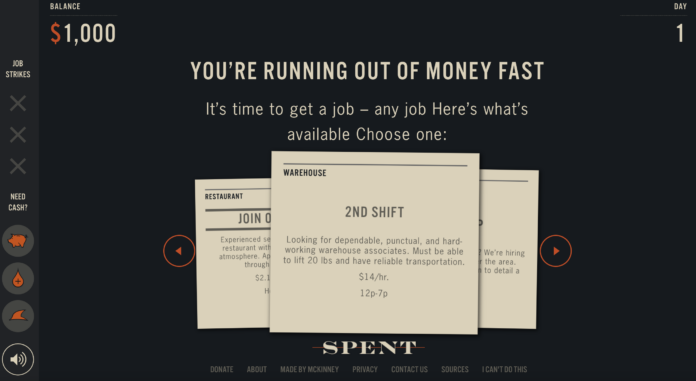SPENT is an online simulation game that has to do with financial decisions and circumstances. It was created by McKinney, an advertising agency, for Urban Ministries of Durham, a non-profit organization in North Carolina to raise awareness about the poverty crisis and to encourage people to help.
I asked 9 participants who were in between 20-32 years old from around the US and England to play this game and record their choices and feelings, thoughts, and questions during gameplay. My goal for having a broad range of locations like Ohio, Texas, California, London, and more was to see if where people lived affected their choices or feelings during the game.
You can see the workshop instructions that I sent to participants and all of my notes from the results at this link: Workshop Instructions & Notes on Results.
From this workshop, there were a few choices, thoughts, and reflections that were repeated by almost every participant or that were thought provoking for me in my research:
- Many participants chose the Temporary Office Job over Restaurant Server and 2nd Shift Warehouse Worker because it had the best pay and it was perceived to be the job with the most opportunity for promotions or advances in career.
- There was a variation in priority given to health insurance and overall physical health because of the financial circumstances within the game
- Many participants expressed forgetting that something had a cost like travel
- Many participants brought up feelings of mental stress and other negative emotions like guilt and shame during the game
- The most emotional responses and guilt came from decisions about their child in the game. Many participants wanted their child to be able to live a full childhood experience but had to say no to many things due to financial reasons.
- Many participants asked friends for help and repeatedly emphasized the importance of having a social circle or community you can rely on. This was also a reason of conflict as many of the participants could not engage in social activities and felt guilt about that
- There were also many mentions of “I don’t want to be that parent” or about “reputation”
- Many participants mentioned that this activity was eye-opening and helped them think about their own priviledges and financial experiences.
- There were many moral and ethical reflections after the game. Many participants talked about this idea that poverty can drive someone to doing things they don’t want to do ethically and morally and how people in poverty are not inherently “less moral,” they are just put in situations where doesn’t seem to be another choice.
- Some participants played the game multiple times to see if they could do better, but no one “won” no one had enough money for rent the day after the month of playing was over.
- This concept of not being able to win no matter what brought up negative feelings in participants and led one participant to say “you try and try and try and it doesnt work so there has to be a systematic error that needs to be brought to attention because it is causing suffering in many ways”
- Many participants had to sacrifice basic needs or paying bills just to keep going in the game
- One participant mentioned that they “gave up notions of luxury, privacy, and dignity because the main focus was survival” and this was reflected in the choices of other participants
- No one paid for internet at home and they all used free public services at the library and were thankful that was something that existed
- Many participants mentioned things about “hope,” “praying for the best” and “hoping for the best” in situations and some used religion as comfort.
Overall, there were many interesting reflections from participants in this workshop and it helped me further understand how people feel when having to make financial decisions or what they would do when their financial wellbeing was at a low. This was a simulation, so there is always the risk of the workshop not being real enough to correctly display thoughts and emotions of participants. However, the simulation did take participants into deeper reflections about personal finance, wellbeing, and poverty which was the overall goal. This workshop was done on a small sample of people in different living situations to see if that affected their gameplay and it was done with people from lower middle-class to middle-class backgrounds.
Links to further explore SPENT:




